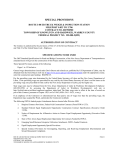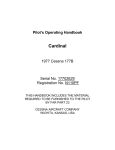Download Heavy Mechanical Foundation - Industry Training Authority
Transcript
PROGRAM OUTLINE Heavy Mechanical Foundation The latest version of this document is available in PDF format on the ITA website www.itabc.ca To order printed copies of Program Outlines or learning resources (where available) for BC trades contact: Crown Publications, Queen’s Printer Web: www.crownpub.bc.ca Email: [email protected] Toll Free 1 800 663-6105 Copyright © 2013 Industry Training Authority This publication may not be modified in any way without permission of the Industry Training Authority Heavy Mechanical Trades Foundation 03/14 Industry Training Authority 1 HEAVY MECHANICAL FOUNDATION PROGRAM OUTLINE APPROVED BY INDUSTRY SEPTEMBER 2013 Developed by Industry Training Authority Province of British Columbia Heavy Mechanical Trades Foundation 03/14 Industry Training Authority 2 TABLE OF CONTENTS Section 1 INTRODUCTION................................................................................................................ 4 Foreword ........................................................................................................................... 5 Acknowledgements ........................................................................................................... 6 How to Use this Document................................................................................................ 7 Section 2 PROGRAM OVERVIEW .................................................................................................... 8 Program Credentialing Model ........................................................................................... 9 Occupational Analysis Chart ........................................................................................... 10 Training Topics and Suggested Time Allocation............................................................. 13 Section 3 PROGRAM CONTENT .................................................................................................... 15 Heavy Mechanical Foundation ........................................................................................ 15 Section 4 TRAINING PROVIDER STANDARDS .......................................................................... 105 Facility Requirements.................................................................................................... 107 Tools and Equipment .................................................................................................... 108 Reference Materials ...................................................................................................... 113 Instructor Requirements ................................................................................................ 114 Heavy Mechanical Trades Foundation 03/14 Industry Training Authority 3 Section 1 INTRODUCTION Heavy Mechanical Foundation Heavy Mechanical Trades Foundation 03/14 Industry Training Authority 4 Introduction Foreword A Heavy Mechanical Foundation student upon successful completion of the Foundation Program will possess the full range of basic knowledge of the Heavy Duty, Truck and Transport, Diesel Engine, and Transport Trailer trades. Upon completion of the Foundation Program the student will have completed the technical in school training related to Level One apprenticeship in the particular trade. The student will possess the abilities and skills required to, safely, adjust, maintain, and operate the equipment or vehicles related to these trades at a Level One apprentice. Heavy Mechanical Foundation student inspects and repairs heavy trucks, commercial trucks, buses, diesel engines, transport trailers, cranes, graders, drills, bulldozers and other heavy equipment for proper performance. They also inspect the vehicles and equipment to detect, and to determine the extent of the repair required. These technicians service engines and engine support systems, hydraulic systems, pneumatics, and drive trains and perform general maintenance and repairs. Other duties include adjusting equipment, welding and cutting, repairing or replacing defective parts, components or systems, using hand and power tools and test equipment. Upon completion of the program, the Heavy Mechanical Foundation student enters into an apprenticeship where they work in the full range of environmental conditions; from comfortable shops to remote sites where inclement weather can be a factor. Shift work is common. Good physical condition is important because the work often requires considerable standing, bending, crawling, lifting, climbing, pulling and reaching. Due to the size and complexity of the equipment, safety is of prime importance. The student must be conscious of the impact on people, equipment, work area and environment when performing their work. Some important attributes of the Heavy Mechanical Foundation student are: Reliabilty Analytical skills Ability to read and understand service manuals Mathematical aptitude They also demonstrate the ability to: Communicate effectively Work with little or no supervision Contribute to a team approach Plan and work sequentially Adapt to changing technology Problem solve Key attributes for people entering this trade are mechanical aptitude, manual dexterity, hand-eye coordination, stamina and agility. Communication skills and patience are also important. Other assets are good vision, hearing and sense of smell to diagnose problems. This occupation may require a valid driver’s license with air endorsement and/or a forklift operator’s certificate. SAFETY ADVISORY Be advised that references to the WorkSafeBC safety regulations contained within these materials do not/may not reflect the most recent Occupational Health and Safety Regulation (the current Standards and Regulation in BC can be obtained on the following website: http://www.worksafebc.com). Please note that it is always the responsibility of any person using these materials to inform him/herself about the Occupational Health and Safety Regulation pertaining to his/her work. Heavy Mechanical Trades Foundation 03/14 Industry Training Authority 5 Introduction Acknowledgements The Program Outline was prepared with the advice and direction of an industry steering committee convened initially by the Transportation Career Development Association. Members include: K. Poisson, Coast Mountain Bus Company (Apprenticeship Coordinator) D. Vallely, Coast Mountain Bus Company (Manager of Mechanics) J. Saunders (Finning - Retired) J. Yardley, Canadian Forces (Mechanic) L. Babcock, Thompson Rivers University (Instructor) R. Lynds, TECK Cominco (Supervisor) L. Richardson, Resource Training Organization (Manager, Program Standards) R. Scales, Industry Training Authority (Manager, Program Standards) Industry Subject Matter Experts retained to assist in the development of Program Outline content: B. Holcik- Finning (Instructor) L. Babcock- Thompson Rivers University (Chair) B. Haugen- Vancouver Community College (Co-chair) P. Mottershead- Vancouver Island Univeristy (Instructor) T. Lockhart - Okanagan Community College (Instructor) R. Tremblay- Northern Lights College (Instructor) C. Hull- College of New Caledonia (Instructor) G. Warne-BCIT (Instructor) Facilitators: G. Shorland (Facilitator and Director, Program Standards) R. Robertson (CEO transCDA) The Industry Training Authority would like to acknowledge the dedication and hard work of all the industry representatives appointed to identify the training requirements of the Heavy Mechanical Foundation program. Heavy Mechanical Trades Foundation 03/14 Industry Training Authority 6 Introduction How to Use this Document This Program Outline has been developed for the use of individuals from several different audiences. The table below describes how each section can be used by each intended audience. Section Training Providers Learners Program Credentialing Model Communicate program length and structure, and all pathways to completion Understand the length and structure of the program, and pathway to completion OAC Communicate the competencies that industry has defined as representing the scope of the occupation View the competencies they will achieve as a result of program completion Training Topics and Suggested Time Allocation Shows proportionate representation of general areas of competency (GACs) at each program level, the suggested proportion of time spent on each GAC, and percentage of time spent on theory versus practical application Understand the scope of competencies covered in the technical training, the suggested proportion of time spent on each GAC, and the percentage of that time spent on theory versus practical application Program Content Defines the objectives, learning tasks, high level content that must be covered for each competency, as well as defining observable, measureable achievement criteria for objectives with a practical component Provides detailed information on program content and performance expectations for demonstrating competency Training Provider Standards Defines the facility requirements, tools and equipment, reference materials (if any) and instructor requirements for the program Provides information on the training facility, tools and equipment provided by the school and the student, reference materials they may be expected to acquire, and minimum qualification levels of program instructors Heavy Mechanical Trades Foundation 03/14 Industry Training Authority 7 Program Overview Section 2 PROGRAM OVERVIEW Heavy Mechanical Foundation Heavy Mechanical Trades Foundation 03/14 Industry Training Authority 8 Program Overview Program Credentialing Model C of Q = Certificate of Qualification C of A = Certificate of Apprenticeship C of C = Certificate of Completion WBT = Work‐Based Training IP = Interprovincial TTT = Transport Trailer Technician TTM = Truck and Transport Mechanic HDET = Heavy Duty Equipment Technician DEM = Diesel Engine Mechanic RED SEAL C of Q TTT C of A TTT C of Q TTM C of A TTM RECOMMENDATION FOR RECOMMENDATION FOR CERTIFICATION CERTIFICATION TTT Level 2 Technical Training: 120 hours (4 weeks*) Work‐Based Training: 3,000 hours IP Red Seal Exam RED SEAL C of Q HDET C of A HDET RECOMMENDATION FOR CERTIFICATION TTM Level 4 Technical Training: 120 hours (4 weeks*) Work‐Based Training: 6,000 hours IP Red Seal Exam HDET Level 4 Technical Training: 120 hours (4 weeks*) Work‐Based Training: 6,000 hours IP Red Seal Exam TTM Level 3 Technical Training: 180 hours (6 weeks*) HDET Level 3 Technical Training: 180 hours (6 weeks*) Work‐Based Training: Accumulate hours Work‐Based Training: Accumulate hours TTM Level 2 Technical Training: 240 hours (8 weeks*) HDET Level 2 Technical Training: 240 hours (8 weeks*) Work‐Based Training: Accumulate hours Work‐Based Training: Accumulate hours TTT Level 1 Technical Training: 300 hours (10 weeks*) TTM Level 1 Technical Training: 300 hours (10 weeks*) HDET Level 1 Technical Training: 300 hours (10 weeks*) Work‐Based Training: Accumulate hours Work‐Based Training: Accumulate hours Work‐Based Training: Accumulate hours APPRENTICESHIP ‐ DIRECT ENTRY APPRENTICESHIP ‐ DIRECT ENTRY C of C CREDIT Heavy Mechanical Foundation Technical Training: Level 1 of TTT, TTM, HDET & DEM WBT: 450 hours for TTT, TTM, HDET & DEM Heavy Mechanical Foundation Technical Training: 36 weeks* RED SEAL APPRENTICESHIP ‐ DIRECT ENTRY C of Q DEM C of A DEM RECOMMENDATION FOR CERTIFICATION DEM Level 2 Technical Training: 240 hours (8 weeks*) Work‐Based Training: 3,000 hours C of Q Exam DEM Level 1 Technical Training: 300 hours (10 weeks*) Work‐Based Training: APPRENTICESHIP ‐ DIRECT ENTRY = same technical training for multiple trades *Suggested duration based on 30‐hour week Heavy Mechanical Trades Foundation 03/14 Industry Training Authority 9 Program Overview Occupational Analysis Chart HEAVY MECHANICAL FOUNDATION Occupation Description: The Heavy Mechanical Foundation program covers the scope of four occupations: Heavy Duty Equipment Technician: “Heavy Duty Equipment Technician” means a person who maintains, manufactures, overhauls, reconditions and repairs equipment powered by internal combustion engines or electricity and without limiting the foregoing, including graders, loaders, shovels, tractors, trucks, forklifts, wheeled and tracked vehicles of all types used in construction, logging, sawmill, manufacturing, mining and other similar industry. Truck & Transport Mechanic: “Truck & Transport Mechanic” means a person who maintains, rebuilds, overhauls, reconditions does diagnostic troubleshooting of motorized commercial truck, bus, and road transport equipment. Diesel Engine Mechanic: “Diesel Engine Mechanic” means a person who installs, repairs, and maintains all internal combustion diesel engines and components used in transport, construction and marine. Transport Trailer Technician: “Transport Trailer Technician” means a person who maintains, rebuilds, overhauls, reconditions, and does diagnostic trouble shooting and repairs of commercial truck and trailers. Occupational Skills Use Safe Work Practices A 1 A1 F Operate Equipment 1 Heavy Mechanical Trades Foundation 03/14 1 Use Environmental Practices A2 F Use Shop Resources and Record Keeping Practices A7 F Use Electronic Media 1 Apply Occupational Health and Safety 1 A8 F Use Cutting and Welding Equipment A13 F 1 Use Hand Tools, Power Tools, and Shop Equipment A3 F 1 Service Winch Wire Rope A9 F 1 Prepare Job Action A14 F 1 A4 F Identify Lubricants 1 Industry Training Authority 1 1 Lift and Support Loads A5 F Service Bearings and Seals A10 F Describe Diagnostic Procedures A15 F Use Fasteners and Fittings 1 A6 F 1 Apply Math and Science A11 F A12 F Prepare for Employment A16 F A17 F 10 Program Overview Brakes Service and Repair Hydraulic Brakes B 1 Hydraulics Service and Repair Hydraulic Power Brakes B1 F Describe Hydraulic Systems C 1 Electrical 1 Frames, Steering and Suspension B2 F 1 B3 F Service Hydraulic Components C1 F Describe Electricity D 1 Service and Repair Air Brakes 1 C2 F Use Electrical Testing Instruments D1 F Service and Diagnose Tires, Wheels, and Hubs 1 Service and Diagnose Batteries D2 F Service Steering Systems E1 1 Service Charging Systems D3 F Service, Diagnose and Repair Suspension Systems E2 1 Service Starting Systems D4 F Remove and Install Undercarriage 1 D6 F Service Electrical Circuits D8 F 1 Diagnose and Repair Frames E4 E5 F F E6 E 1 Trailer Service Landing Gear and Trailer Accessories F 1 Heating, Ventilation & Air Conditioning F1 F Describe Heating and Air Conditioning Fundamentals G 1 Heavy Mechanical Trades Foundation 03/14 F G1 F 1 F 1 Service and Repair Coupling Systems 1 Service, Diagnose and Repair Trailer Body Components F2 F 1 1 F Service, Diagnose and Repair Heating and Refrigeration Systems F3 F 1 F4 F Diagnose and Repair Heating and Air Conditioning Systems 1 G2 F Industry Training Authority 11 Program Overview Engines and Supporting Systems Service Engine Support Systems H Powertrain Service Diesel Fuel Supply Systems H2 F Service Clutches I H4 F I4 F Remove and Install Transmissions I15 F Identify Protective Structures 1 Heavy Mechanical Trades Foundation 03/14 Service Torque Converters and Dividers I2 F J H6 F Service Manual Transmissions Service Final Drives Structural Components & Accessories Service Gasoline Fuel Systems I7 F Remove and Install Drivelines and Differentials I20 F Remove and Install Diesel Engine Service, Diagnose and Repair Electronic Ignition Systems H9 F H16 F Service Powershift and Automatic Transmissions I8 F Service Drivelines Service Drive Axles I11 F I13 F Remove and Install Final Drives I21 F I22 F Service Cab Structures J1 F 1 J2 F Industry Training Authority 12 Program Overview Training Topics and Suggested Time Allocation Heavy Mechanical Foundation % of Time Allocated to: Theory Practical Total 70% 30% 100% Line A A1 A2 A3 A4 A5 A6 A7 A8 A9 A10 A11 A12 A13 A14 A15 A16 A17 OCCUPATIONAL SKILLS Use Safe Work Practices Apply Occupational Health and Safety Use Environmental Practices Use Hand Tools, Power Tools, and Shop Equipment Use Fasteners and Fittings Lift and Support Loads Operate Equipment Use Shop Resources and Record Keeping Practices Service Winch Wire Rope Identify Lubricants Service Bearings and Seals Apply Math and Science Use Electronic Media Use Cutting and Welding Equipment Prepare Job Action Describe Diagnostic Procedures Prepare for Employment 30% Line B B1 B2 B3 BRAKES Service and Repair Hydraulic Brakes Service and Repair Hydraulic Power Brakes Service and Repair Air Brakes 12% 47% 53% 100% Line C C1 C2 HYDRAULICS Describe Hydraulic Systems Service Hydraulic Components 6% 71% 29% 100% Line D D1 D2 D3 D4 D6 D8 ELECTRICAL Describe Electricity Use Electrical Testing Instruments Service and Diagnose Batteries Service Charging Systems Service Starting Systems Service Electrical Circuits 10% 45% 55% Line E E1 E2 E4 E5 E6 FRAMES, STEERINGAND SUSPENSION Service and Diagnose Tires, Wheels, and Hubs Service Steering Systems Service, Diagnose and Repair Suspension Systems Remove and Install Undercarriage Diagnose and Repair Frames 15% 43% 57% Heavy Mechanical Trades Foundation 03/14 % of Time Industry Training Authority 100% 100% 13 Program Overview % of Time Allocated to: Theory Practical Total Line F F1 F2 F3 F4 TRAILER Service Landing Gear and Trailer Accessories Service and Repair Coupling Systems Service, Diagnose and Repair Trailer Body Components Service, Diagnose and Repair Heating and Refrigeration Systems 6% 69% 31% 100% Line G G1 G2 HEATING, VENTILATION AND AIR CONDITIONING Describe, Heating and Air Conditioning Fundamentals Diagnose and Repair Heating and Air Conditioning Systems 3% 50% 50% 100% Line H H2 H4 H6 H9 H16 ENGINES AND SUPPORTING SYSTEMS Service Engine Support Systems Service Diesel Fuel Supply Systems Service Gasoline Fuel Systems Remove and Install Diesel Engine Service, Diagnose and Repair Electronic Ignition Systems 9% 32% 68% Line I I2 I4 I7 I8 I11 I13 I15 I20 I21 I22 POWERTRAINS Service Clutches Service Manual Transmissions Service Torque Converters and Dividers Service Powershift and Automatic Transmissions Service Drivelines Service Drive Axles Service Final Drives Remove and Install Transmissions Remove and Install Drivelines and Differentials Remove and Install Final Drives 8% 36% 64% 100% Line J J1 J2 STRUCTURAL COMPONENTS AND ACCESSORIES Identify Protective Structures Service Cab Structures 1% 76% 24% 100% Total Percentage for Heavy Mechanical Foundation 100% Heavy Mechanical Trades Foundation 03/14 % of Time Industry Training Authority 100% 14 Program Content Section 3 Section 3 PROGRAM CONTENT Heavy Mechanical Foundation Heavy Mechanical Trades Foundation 03/14 Industry Training Authority 15 Program Content Section 3 Line (GAC): A OCCUPATIONAL SKILLS Competency: A1 Use Safe Work Practices Objectives To be competent in this area, the individual must be able to: Apply personal safety measures. Identify and use shop emergency equipment. Prevent, identify and extinguish various classes of fires. LEARNING TASKS 1. Apply personal safety precautions and procedures 2. Lock out heavy duty equipment prior to service Heavy Mechanical Trades Foundation 03/14 CONTENT Personal apparel Clothing Hair and beards Jewellery Personal protective equipment o Head o Hands o Lungs o Eyes o Ears o Feet Safety meetings Housekeeping Maintaining PPE Equipment and machine lock-out Ventilation systems Clear head Professionalism Respect for others’ safety Constant awareness of surroundings Lifting WorkSafeBC requirements Electrical isolation (Night Switch) Tag Key storage Industry Training Authority 16 Program Content Section 3 LEARNING TASKS 3. Locate shop emergency equipment and procedures 4. 5. 6. 7. 8. Describe the conditions necessary to support a fire Describe the classes of fires according to the materials being burned Apply preventative fire safety precautions when working near, handling or storing flammable liquids or gases, combustible materials and electrical apparatus Describe the considerations and steps to be taken prior to fighting a fire Describe the procedure for using a fire extinguisher Heavy Mechanical Trades Foundation 03/14 CONTENT Emergency shutoffs Fire control systems Eye wash facilities Emergency exits First aid facilities Emergency contact/phone numbers Outside meeting place Disaster meeting place Air Fuel Heat Class A Class B Class C Class D Symbols and colours Fuels Diesel Gasoline Propane Natural Gas Ventilation Purging Lubricants Oily rags Combustible metals Aerosols Warning others and the Fire Department Evacuation of others Fire contained and not spreading Personal method of egress Training P.A.S.S. o Pull o Aim o Squeeze o Sweep Industry Training Authority 17 Program Content Section 3 LEARNING TASKS 9. Describe fire suppression systems Heavy Mechanical Trades Foundation 03/14 CONTENT Types Construction Operation Disarming Industry Training Authority 18 Program Content Section 3 Line (GAC): A OCCUPATIONAL SKILLS Competency: A2 Apply Occupational Health and Safety Objectives To be competent in this area, the individual must be able to: Identify WorkSafeBC policies and procedures. LEARNING TASKS 1. State the “Core Requirements” of the Occupational Health and Safety Regulations 2. Locate the “General Hazard Requirements” of the Occupational Health and Safety Regulations Heavy Mechanical Trades Foundation 03/14 CONTENT Definitions Application Right and responsibilties o Health and safety programs o Investigations and reports o Workplace inspections o Right to refuse work General conditions o Building and equipment safety o Emergency preparedness o Preventing violence o Working alone o Ergonomics o Illumination o Indoor air quality o Smoking and lunchrooms Chemical and biological substances Substance specific requirements Noise, vibration, radiation and temperature Personal protective clothing and equipment Confined spaces De-energization and lockout Fall protection Tools, machinery and equipment Ladders, scaffolds and temporary work platforms Cranes and hoists Rigging Mobile equipment Transportation of workers Traffic control Electrical safety Industry Training Authority 19 Program Content Section 3 Line (GAC): A OCCUPATIONAL SKILLS Competency: A3 Use Environmental Practices Objectives To be competent in this area, the individual must be able to: Describe the purpose of the Workplace Hazourdous Materials Information System (WHMIS) Regulations. Explain the contents of the Material Safety Data Sheets (MSDS). Explain the content of a WHMIS label. Apply WHMIS regulations. LEARNING TASKS 1. State the legislation that requires suppliers of hazardous materials to provide MSDSs and label products as a condition of sale and importation 2. 3. State the purpose of the Workplace Hazardous Materials Information System (WHMIS) Describe the key elements of WHMIS Hazardous Product Act Controlled Products Regulations Ingredients Disclosure List Hazardous Materials Information Review Act Hazardous Materials Information Review Regulations Protection of Canadian workers from the adverse effects of hazardous materials through the provision of relevant information while minimizing the economic impact on industry and the disruption of trade Recognition of rights o Workers o Employers o Suppliers o Regulators Material safety data sheets (MSDSs) Labeling of containers of hazardous materials Worker education programs 4. Describe the responsibilities of suppliers under WHMIS Provide o MSDSs o Labels 5. Describe the responsibilities of employers under WHMIS Provide o MSDSs o Labeling o Worker education Heavy Mechanical Trades Foundation 03/14 CONTENT Industry Training Authority 20 Program Content Section 3 LEARNING TASKS 6. Describe information to be disclosed on a MSDS 7. Identify symbols found on WHMIS labels and their meaning Hazardous ingredients Preparation information Product information Physical data Fire or explosion Reactivity data Toxicological properties Preventive measures First-aid measures Compressed gases Flammable and combustible materials Oxidizing materials Poisonous and infectious materials o Materials causing immediate and serious toxic effects o Materials causing other toxic effects o Bio-hazardous infectious materials Corrosive materials Dangerously reactive materials 8. Apply WHMIS regulations as they apply to hazardous materials used in the shop Use, storage and disposal of o Solvents o Caustic cleaners o Cleaning solutions o Alcohol used for cleaning o Gasoline o Diesel fuel o L.P.G. o C.N.G. o Asbestos o Battery acid o Refrigerants o Brake fluid o Antifreeze o Lubricants o Tracer dyes 9. Identify current environmental standards Environmental Protection Agency (EPA) Hazardous Materials (HAZMAT) Industry Standards Heavy Mechanical Trades Foundation 03/14 CONTENT Industry Training Authority 21 Program Content Section 3 Line (GAC): A OCCUPATIONAL SKILLS Competency: A4 Use Hand Tools, Power Tools and Shop Equipment Objectives To be competent in this area, the individual must be able to: Select, use and maintain tools and shop equipment. Select, use and maintain safety equipment. LEARNING TASKS 1. Use protective equipment associated with the use of tools and shop equipment 2. 3. Apply lock-out procedures to shop equipment Select, use and maintain hand tools Heavy Mechanical Trades Foundation 03/14 CONTENT Personal Protective Equipment o Head o Hands o Lungs o Eyes o Ears o Feet o Clothing Screening Guarding Ventilation Clean up WorkSafeBC lock-out procedures Electrical isolation Tags Locks Hand tool safety o Safety practices o Work with a safe attitude o Tool selection o Organize work area o Correct usage of hand tools o Maintain hand tools o Safe tool handling o Safe tool storage Hazards Wrenches Screwdrivers Cutting tools Hammers Chisels/punches Pry bars Pliers Industry Training Authority 22 Program Content Section 3 LEARNING TASKS 4. 5. 6. 7. Select, use and maintain measuring instruments Select, use and maintain power tools Select, use and maintain drill bits Select, use and maintain shop equipment Heavy Mechanical Trades Foundation 03/14 CONTENT Clamping tools Abrasives Pullers Torque wrenches and multipliers Layout tools Precision measuring Imperial Metric Micrometer Veriner Dial indicator Feeler/thickness gauges Bore gauges Pneumatic Electric Hydraulic Types Sharpening Cutting speeds Presses Parts cleaning equipment o Hot tank o Cold solution o Hot agitator o Solvent tank o Pressure washer o Steam cleaner o Chemical cleaners Drill press Glass beader Sand blaster Grinders Compressor Cut-off saws Industry Training Authority 23 Program Content Section 3 Line (GAC): A OCCUPATIONAL SKILLS Competency: A5 Use Fasteners and Fittings Objectives To be competent in this area, the individual must be able to: Select and use imperial and metric fasteners. Select and use pipe, tubing, hose and fittings. LEARNING TASKS 1. Select and use imperial and metric fasteners 2. 3. Cut and repair internal and external threads Select use and repair tubing, pipe and fittings Heavy Mechanical Trades Foundation 03/14 CONTENT Thread systems Fastener types o Installation Washers o Types o Applications Locking devices o Types o Applications Taps Dies Thread repair Tubing o Types o Sizing o Applications Pipe o Types o Sizing Threads o Applications Fitting o Types o Sizing o Applications Assembly procedures Sealants Cutting, bending and flaring Industry Training Authority 24 Program Content Section 3 LEARNING TASKS 4. Select and use hose and hose fittings Heavy Mechanical Trades Foundation 03/14 CONTENT Hose o Types o Sizing o Applications Assembly Hose fittings o Types Industry Training Authority 25 Program Content Section 3 Line (GAC): A OCCUPATIONAL SKILLS Competency: A6 Lift and Support Loads Objectives To be competent in this area, the individual must be able to: Apply the WorkSafeBC Safety Regulations to lifting and blocking applications. Select, use and maintain lifting and blocking equipment. Lift and move loads. LEARNING TASKS 1. Apply the Occupational Health and Safety Regulations CONTENT Refer to Regulations o PPE o Clothing o Housekeeping o Safe lifting and carrying o Safe handling with cranes 2. Determine load weight Manufacturer’s specification Estimation 3. Select, use and maintain jacks Types Capacities 4. Select, use and maintain stands and blocking Manufacturer’s procedures Types Capacities Bridging 5. Select, use and maintain wire ropes, chains and lifting straps Types Capacities Inspection Rating tags Rigging and lifting attachments 6. Use fibre rope knots, bends and hitches Types Uses Care and maintenance 7. Use visual and sound signals WorkSafeBC Safety Regulations o Hand o Sound 8. Select, use and maintain hoisting equipment Types Capacities Operation 9. Lift, hoist and move loads Determine safe working load Lifting and rigging procedures Regulations and specifications Heavy Mechanical Trades Foundation 03/14 Industry Training Authority 26 Program Content Section 3 Line (GAC): A OCCUPATIONAL SKILLS Competency: A7 Operate Equipment Objectives To be competent in this area, the individual must be able to: Perform pre-start and walk around inspections. Start, move, secure and stop equipment. Obtain forklift operation training. LEARNING TASKS 1. Describe pre-start and walk around inspections 2. 3. Describe starting aids Describe start up procedures Checklist Operator’s manuals Glow plug systems Intake preheater systems Starting fluids Block/circulating heaters Battery warmers Controls Cranking Monitoring Jump starting 4. Describe emergency shut down procedures Cut-off o Fuel o Air 5. Start, operate and shut down selected equipment Pre-start and walk around Use of starting aids Moving Securing and shutting down WorkSafeBC requirements Electrical isolation (Night switch) Tag Key in pocket Safe operation Forklift training (certification optional) o Occupational Health and Safety Regulations o Maintenance and records 6. 7. Lock-out heavy duty equipment prior to service Operate a forklift Heavy Mechanical Trades Foundation 03/14 CONTENT Industry Training Authority 27 Program Content Section 3 Line (GAC): A OCCUPATIONAL SKILLS Competency: A8 Use Shop Resources and Record Keeping Practices Objectives To be competent in this area, the individual must be able to: Communicate using forms and reports. Use computers and written media to locate service and maintenance information. LEARNING TASKS 1. Use record keeping forms Business forms o Work order o Parts requisition o Purchase order Record keeping forms o Time sheets and daily time card o Equipment log o Maintenance log o Personal log o Maintenance schedule o Warranty 2. Describe the requirements for report writing Types of reports o Service o Structure o Inclusions or attachments o Shift end o Maintenance log o Accident o Safety o Digital media 3. Use manuals Technical o Service o Repair Parts Systems Operators Heavy Mechanical Trades Foundation 03/14 CONTENT Service bulletins/updates Digital media Industry Training Authority 28 Program Content Section 3 Line (GAC): A OCCUPATIONAL SKILLS Competency: A9 Service Winch Wire Rope Objectives To be competent in this area, the individual must be able to: Describe wire rope and its applictions. Inspect and service wire rope used on winches. LEARNING TASKS 1. Describe wire rope 2. 3. Inspect wire rope Service wire rope Heavy Mechanical Trades Foundation 03/14 CONTENT Types o Regular lay o Lang lay Construction Application Safe working load Frequency Wear Damage Inspection Remove Repair or replace Lubrication Scheduled maintenance Industry Training Authority 29 Program Content Section 3 Line (GAC): A OCCUPATIONAL SKILLS Competency: A10 Identify Lubricants Objectives To be competent in this area, the individual must be able to: Identify and select lubricants. LEARNING TASKS 1. Describe the theory of lubrication 2. 3. Describe the properties of lubricants Describe the use of lubricants Heavy Mechanical Trades Foundation 03/14 CONTENT Friction Purpose Viscosity Viscosity Index Additives Types o Oils o Greases o Dry lubricants o Synthetics o Brake fluids o Environmentally Friendly Liquids (EFL) Ratings o American Petroleum Institute (API) o Society of Automotive Engineers (SAE) o International Standardization Organization (ISO) o Military Standards o International Lubricant Standardization Approval Committee (ILSAC) Applications Oils Greases Dry lubricants Synthetics Brake fluids o Dot 3 o Dot 4 o Dot 5 Manufacturer’s specifications Minimum requirements Warranty issues Industry Training Authority 30 Program Content Section 3 LEARNING TASKS 4. Handle lubricants 5. Perform fluid analysis Heavy Mechanical Trades Foundation 03/14 CONTENT Storage Disposal Personal protection Procedures Safety Reports o Contamination o Condition o Recommendations Industry Training Authority 31 Program Content Section 3 Line (GAC): A OCCUPATIONAL SKILLS Competency: A11 Service Bearings and Seals Objectives To be competent in this area, the individual must be able to: Select and service bearings and seals. LEARNING TASKS 1. Describe bearings 2. 3. 4. Select and service bearings Describe seals Select and service seals Heavy Mechanical Trades Foundation 03/14 CONTENT Purpose Types o Friction o Antifriction Terminology Applications Loads o Axial o Radial Removal Clean Inspection Lubrication Storage Installation Adjustments Types o Static o Dynamic Applications Removal Inspection Installation Industry Training Authority 32 Program Content Section 3 LINE (GAC): A OCCUPATIONAL SKILLS Competency: A12 Apply Math and Science Objectives To be competent in this area, the individual must be able to: Use mathematics to solve problems involving whole numbers. Describe key terms and concepts for working with fractions. Solve problems involving common fractions. Describe key terms and concepts for working with decimals. Convert between common decimal fractions. Solve problems involving decimal fractions. Describe and convert between metric and imperial measurements. Describe key terms and concepts for working with ratio and proportion. Use ratio and proportion to solve problems. Describe and use key terms and concepts for equations and formulas. Solve problems using perimeters, areas and volume. Describe and use angles and geometric construction. LEARNING TASKS 1. Identify words indicating mathematical operations Operations o Addition o Subtraction o Multiplication o Divisions 2. Solve word problems involving whole numbers Process 3. Describe key terms and concepts for working with fractions Numerator Denominator Terms Proper fraction Improper fraction Mixed number Common fraction Reciprocal Lowest common denominator Unlike fractions Like fractions Mixed numbers Proper fractions Improper fractions Mixed numbers 4. 5. Add and subtract fractions Multiply and divide fractions Heavy Mechanical Trades Foundation 03/14 CONTENT Industry Training Authority 33 Program Content Section 3 LEARNING TASKS 6. Solve word problems involving fractions Process 7. Place value Significant digits Rounding Repeating decimal fractions Conversion o Decimal to fraction o Fraction to decimal Fraction with lowest terms Place value Word problems Units 8. 9. 10. 11. 12. Describe key terms and concepts for working with decimals Convert between decimals and fractions Add, subtract, multiply and divide decimals Describe metric measurement Convert between the metric and imperial system of measurement Describe key terms and concepts for working with ratio and proportion Prefixes Converting within the metric system Length Mass Volume Temperature Pressure Torque Ratio o Formulas Proportion o Cross multiplication 13. Solve word problems involving ratio and proportion Process 14. Describe key terms and concepts for equations and formulas Equation Formula Constant Solution 15. 16. 17. Solve problems involving formulas Solve problems involving perimeters Solve problems involving area Heavy Mechanical Trades Foundation 03/14 CONTENT Operational symbols Order of operations Word problems Calculations Formulas Calculations Formulas Industry Training Authority 34 Program Content Section 3 LEARNING TASKS 18. Solve problems involving volume 19. 20. Describe key terms and concepts associated with using angles Use angles Heavy Mechanical Trades Foundation 03/14 CONTENT Calculations Formulas Angle Degree Vertex Angle types o Acute o Right o Obtuse o Straight o Reflex o Complementary o Supplementary o Opposite Triangle Triangle types o Right o Equilateral o Isosceles o Similar Protractors Inclinometer Angles and parallel lines Units of angle measurement 3:4:5 triangles o Pythagorean theorem Industry Training Authority 35 Program Content Section 3 Line (GAC): A OCCUPATIONAL SKILLS Competency: A13 Use Electronic Media Objectives To be competent in this area, the individual must be able to: Use computers to create documents and conduct research. Use electronic imaging equipment. LEARNING TASKS 1. Use computers 2. Use electronic media Heavy Mechanical Trades Foundation 03/14 CONTENT Hardware Keyboarding Software Operating system o Windows o Managing files o Printing Applications o Word processing o Internet access o E-mail o On-line resources o Data bases Digital camera Digital video Industry Training Authority 36 Program Content Section 3 Line (GAC): A OCCUPATIONAL SKILLS Competency: A14 Use Cutting and Welding Equipment Objectives To be competent in this area, the individual must be able to: Identify metals. Describe different welding procedures. Cut, weld and braze using oxy-acetylene. Perform shielded metal arc weld. Weld using wire feed processes. Solder tubing and sheet metal. LEARNING TASKS 1. Identify regulations with respect to welding WorkSafeBC Safety Regulations 2. Metals and alloys Teminology Shapes Storage and handling Gases Valves and regulators Cylinders Hoses and fittings Cutting torches and tips Safety precautions Blow back Check valves Assembly procedures Operation procedures Lighting Pressures 3. 4. 5. Identify metals Identify oxy-acetylene components Use oxy-acetylene equipment Cut mild steel with oxy-acetylene equipment Heavy Mechanical Trades Foundation 03/14 CONTENT Adjusting Shut down procedures Leak testing Storage Set-up Freehand cuts Guided cuts Hole piercing Industry Training Authority 37 Program Content Section 3 LEARNING TASKS 6. Weld mild steel with oxy-acetylene equipment 7. 8. 9. 10. 11. 12. Braze lap joints with oxy-acetylene equipment Solder tubing and sheet metal Describe the shielded metal arc welding (SMAW) process Identify shielded metal arc welding equipment Identify mild steel electrodes for shielded metal arc welding Weld mild steel with shielded metal arc Heavy Mechanical Trades Foundation 03/14 CONTENT Principles of fusion welding Filler metal Flux Welding tips Flame Technique Basic joints Brazing set-up Brazing techniques Process and procedures Solder types o 60/40 o 40/60 o Rosin core o Acid core Process Applications Safety requirements AC/DC machines Components Electrode holder Ground clamps Cables Connectors Types Operations Classifications Selection Storage and handling Procedures Weld ground placement Settings Positions Joints Types of welds Industry Training Authority 38 Program Content Section 3 LEARNING TASKS 13. Weld mild steel using wire feed processes 14. Describe air-arc gouging Heavy Mechanical Trades Foundation 03/14 CONTENT Procedures Settings Safety Weld types and positions Wire type Purpose Procedure Safety Industry Training Authority 39 Program Content Section 3 Line (GAC): A OCCUPATIONAL SKILLS Competency: A15 Prepare Job Action Objectives To be competent in this area, the individual must be able to: Describe the importance of following a diagnostic procedure. Describe the procedures to prepare a job action. LEARNING TASKS 1. Describe the importance of preparing a job action 2. Describe the procedures to prepare a job action Heavy Mechanical Trades Foundation 03/14 CONTENT Cost of improper diagnosis Unhappy customers Lost business Time management Efficiency Damage to components Understand system Understand complaint o Communicate with operator o Operational test o Visual inspection Access documentation Personal Protective Equipment Environmental considerations Tools and equipment Parts Industry Training Authority 40 Program Content Section 3 Line (GAC): A OCCUPATIONAL SKILLS Competency: A16 Describe Diagnostic Procedures Objectives To be competent in this area, the individual must be able to: Describe the importance of following a diagnostic procedure. Describe diagnostic procedures used for troubleshooting. LEARNING TASKS 1. Describe the importance of following a diagnostic process 2. 3. 4. Describe general diagnostic procedures Cost of improper diagnosis Unhappy customers Lost business Time management Efficiency Damage to components Understand system Understand complaint Communicate with operator Operational test Visual inspection Form all possible conclusions Test conclusions System component isolation Describe the importance of following manufacturer’s diagnostic procedures where available Time saving Warranty requirement Diagnostic efficiency Describe the importance of failure analysis Repeat failure Extend life Cost Customer satisfaction Heavy Mechanical Trades Foundation 03/14 CONTENT Industry Training Authority 41 Program Content Section 3 Line (GAC): A OCCUPATIONAL SKILLS Competency: A17 Prepare for Employment Objectives To be competent in this area, the individual must be able to: Describe the areas and types of vehicles and equipment maintained and repaired. Describe different business types. Describe relationships between business, labour, and government. Demonstrate postive employee attributes. Describe employer responsibilities. Prepare a resume and identify job search resources. Prepare for an interview. LEARNING TASKS 1. Describe the areas and types of vehicles and equipment maintained and repaired Types of equipment for heavy mechanical trades o Buses o Excavators o Trucks o Loaders o Tractors o Trailers o Dozers 2. Current apprenticeship training Physical and mental requirements Job opportunites o Locations o Advancement o Specialization Types of employment opportunities o Dealerships o Fleets o Independents 3. 4. 5. Describe the current heavy mechanics trade Describe the range of working conditions Describe types of businesses Describe labour groups Heavy Mechanical Trades Foundation 03/14 CONTENT Pay scales Hours of work Working environments Quality control Independent Dealerships Fleets Union Non-union Industry Training Authority 42 Program Content Section 3 LEARNING TASKS 6. Describe legislation affecting employment 7. 8. 9. 10. Describe positive employee attributes Describe employer responsibility Prepare a resume Prepare a cover letter Heavy Mechanical Trades Foundation 03/14 CONTENT Federal Jurisdiction Employment Standards Labour Relations Code Workers’ Compensation Act Other Health and Safety Regulations Human Rights Acts Occupational Environmental Regulations WHMIS Motor Vehicle Act ICBC Communication Critical thinking Desire to continue learning Positive attitude Responsibility Adaptability Team skills Care for quality Personal care Following safety regulations Respect Trust Fairness Safe work site Timely payment Follow applicable legislations Gathering information o Goals o Skills o Education o Experience o Personal information o References Organization of the resume Types of resumes o Chronological o Functional o Combination Composition o Opening Paragraph o Middle Paragraph Industry Training Authority 43 Program Content Section 3 LEARNING TASKS CONTENT o Closing Paragraph 11. Newspapers Internet Networking Industry publications Direct approach Research of the organization Review of job qualifications Prepare for broad personal questions Review of resume Interview practice 12. 13. Identify job search sources Prepare for an interview Follow up on an interview Heavy Mechanical Trades Foundation 03/14 Personal appearance Arriving ahead of time Written o Letter of appreciation Verbal Industry Training Authority 44 Program Content Section 3 Line (GAC): B BRAKES Competency: B1 Service and Repair Hydraulic Brakes Objectives To be competent in this area, the individual must be able to: Service hydraulic brake systems. Diagnose hydraulic brake systems. Repair hydraulic brake systems. LEARNING TASKS 1. Describe the principles of braking 2. 3. Describe the foundation brake Review hydraulic principles Heavy Mechanical Trades Foundation 03/14 CONTENT Friction Definition Coefficient Heat Absorbing Dissipating Effects of speed and weight Brake fade Types o Disk o Drum o Multidisc o Others Components o Calipiers o Wheel cylinder o Lines o Shoes/pads Operation o Self energizing and non-self energizing o Servo/non-servo Pressure, force and area Industry Training Authority 45 Program Content Section 3 LEARNING TASKS 4. Describe the hydraulics of a brake system 5. 6. 7. 8. Select brake fluids Describe parking brake systems Diagnose hydraulic brake systems Repair hydraulic brake systems Heavy Mechanical Trades Foundation 03/14 CONTENT Types o Disk o Drum o Multidisc o Others Components o Master cylinder o Metering valve o Proportioning valve o Switches Operation Requirements Types o DOT 3 o DOT 4 o DOT 5 o Others Characteristics o Hygroscopic o Boiling point o Viscosity Identification Types o Integral o Driveline o Hydraulic o Mechanical Components Operation Diagnostic procedures o Operational checks o Fluid condition/level Inspection Components o Hydraulic o Mechanical Inspection Remove Repair or replace Install Flush/bleed Industry Training Authority 46 Program Content Section 3 LEARNING TASKS 9. Service parking brake systems 10. CONTENT Perform preventive maintenance Inspection Remove Repair or replace Install Inspection Operational tests Fluid level checks Adjustment Lubrication Achievement Criteria Performance B1 Service and Repair Hydraulic Brakes Conditions The learner will require: Tools Test equipment Manufacturer’s specifications A work place or training environment Equipment with hydraulic disk and drum brakes Criteria The learner will be competent once the performance criteria is met: Followed safe work practices throughout entire task including lock out procedures Conducted in a logical manner Conducted according to manufacturer’s specifications Conducted according to work place requirements Throughout the term of the apprenticeship, the learner must conduct the above performance a multiple of times and in a variety of contexts Heavy Mechanical Trades Foundation 03/14 Industry Training Authority 47 Program Content Section 3 Line (GAC): B BRAKES Competency: B2 Service and Repair Hydraulic Power Brakes Objectives To be competent in this area, the individual must be able to: Diagnose hydraulic assisted power brake systems. Repair hydraulic assisted power brake systems. Describe hydraulic anti-lock braking (ABS) systems. Diagnose and repair hydraulic anti-lock braking (ABS) systems. LEARNING TASKS 1. Describe the power brake systems 2. 3. 4. Diagnose power brake systems Repair power brake systems Describe hydraulic anti-lock braking systems Heavy Mechanical Trades Foundation 03/14 CONTENT Types o Vacuum boosters o Hydro-boost o Hydro-max o Hydraulic Components Operation Diagnostic procedures Operational test Components Inspection Testing Inspection Remove Repair or replace Install Adjustments Verify system operation Types o Single channel o Two channel o Four channel Components Operation Precautions Industry Training Authority 48 Program Content Section 3 LEARNING TASKS 5. Diagnose hydraulic anti-lock braking systems 6. Repair hydraulic anti-lock braking systems CONTENT Manufacturer’s diagnostic procedures Road test Diagnostic codes Components Inspection Testing Inspection Remove Repair or replace Install Adjustments Verify system operation Diagnostic codes Achievement Criteria Performance B2 Service and Repair Hydraulic Power Brakes Conditions The learner will require: Tools Test equipment Manufacturer’s specifications A work place or training environment Equipment with hydraulic disk and drum brakes Criteria The learner will be competent once the performance criteria is met: Followed safe work practices throughout entire task including lock out procedures Conducted in a logical manner Conducted according to manufacturer’s specifications Conducted according to work place requirements Throughout the term of the apprenticeship, the learner must conduct the above performance a multiple of times and in a variety of contexts Heavy Mechanical Trades Foundation 03/14 Industry Training Authority 49 Program Content Section 3 Line (GAC): B BRAKES Competency: B3 Service and Repair Air Brakes Objectives To be competent in this area, the individual must be able to: Describe the principles of braking. Describe the principles of pneumatics. Describe air brake schedules and components. Service air brake systems. Repair a wheel brake assembly. Describe and perform a pre-trip inspection. LEARNING TASKS 1. Describe the principles of braking 2. 3. Describe the principles of pneumatics Describe a basic air brake system Heavy Mechanical Trades Foundation 03/14 CONTENT Friction Definition Coefficient Heat Absorbing Dissipating Effects of speed and weight Brake fade Water cooling Characteristics of air Relationship between force, pressure and area Effects of heat on air Time lag Pneumatic balance Sub systems Supply Delivery Foundation brakes o Drum o Disc Components o Compressor o Governor o Treadle o Relay o Brake chamber Operation Industry Training Authority 50 Program Content Section 3 LEARNING TASKS 4. Describe the basics of air brake schedules 5. 6. Repair foundation brake assembly Service and inspect air brakes CONTENT 121 S SX Operation and routine maintenance Inspection Disassembly Replacement Measurement Assembly Adjustment Tractor and trailer Components o Foundation brakes o Reservoirs o Lines o Disc/Drum Adjustment Scheduled maintenance 7. Describe tractor trailer pre-trip brake inspection As per motor vehicle standards 8. Perform a tractor trailer pre-trip brake inspection As per motor vehicle standards Achievement Criteria Performance B3 Service and Repair Air Brakes Conditions The learner will require: Tools Test equipment Manufacturer’s specifications A work place or training environment Equipment with hydraulic disk and drum brakes Criteria The learner will be competent once the performance criteria is met: Followed safe work practices throughout entire task including lock out procedures Conducted in a logical manner Conducted according to manufacturer’s specifications Conducted according to work place requirements Throughout the term of the apprenticeship, the learner must conduct the above performance a multiple of times and in a variety of contexts Heavy Mechanical Trades Foundation 03/14 Industry Training Authority 51 Program Content Section 3 Line (GAC): C HYDRAULICS Competency: C1 Describe Hydraulic Systems Objectives To be competent in this area, the individual must be able to: Describe the principles of hydraulics. Describe the basic components of a hydraulic system. Describe the types of hydraulic systems. LEARNING TASKS 1. Describe the principles of hydraulics 2. 3. Describe the basic operation of a hydraulic system Describe types of hydraulic systems Heavy Mechanical Trades Foundation 03/14 CONTENT Terminology Advantages/Disadvantages Fluid characteristics Pascal’s Law Calculations Bernoulli’s Principle Components Reservoir o Vented o Pressurized Pump o Positive displacement Gear Vane Piston o Ratings Control valves o Pressure o Directional o Volume Actuators o Cylinder o Motor Connecting lines Hydraulic fluids Open-centre Closed-centre Vented Pressurized Industry Training Authority 52 Program Content Section 3 LEARNING TASKS 4. Interpret basic hydraulic diagrams Heavy Mechanical Trades Foundation 03/14 CONTENT Types o Pictorial o Schematic Basic symbols Industry Training Authority 53 Program Content Section 3 Line (GAC): C HYDRAULICS Competency: C2 Service Hydraulic Components Objectives To be competent in this area, the individual must be able to: Describe selected hydraulic components. Select hydraulic fluids for applications. Select and assemble hydraulic hoses and fittings. Demonstrate safe work procedures for hydraulic systems service. Perform scheduled maintenance on hydraulic systems. LEARNING TASKS 1. Describe hydraulic components 2. 3. 4. Select hydraulic fluids Select hydraulic hoses and fittings Assemble hydraulic hoses and fittings Heavy Mechanical Trades Foundation 03/14 CONTENT Seals Hoses/lines Fittings Filters Requirements SAE viscosity ratings ISO viscosity ratings API service ratings Manufacturer’s specifications Synthetic/Non-synthetic (mineral) Component/System compatibility Hose construction Working pressure Ratings Compatability Hose application Fitting types o National Pipe Thread (NPT) o Joint Industry Conference (JIC) o O-ring Boss (ORB) o O-ring Face (ORFS) o Split flange o Society of Automotive Engineers (SAE) o Reusable/Permanent Permanent Reusable Industry Training Authority 54 Program Content Section 3 LEARNING TASKS 5. Demonstrate safe work procedures 6. CONTENT Perform scheduled maintenance Safety blocking equipment and attachments Relieve pressure Reservoir venting Actuator neutralization Temperature hazards Visual inspection Leaks Hose rubs External damage Fluid level check Filter change, fluid change, fluid analysis Strainers Flushing system Achievement Criteria Performance C2 Service Hydraulic Components Conditions The learner will require: Criteria Tools Test equipment Manufacturer’s specifications A work place or training environment Equipment with mobile hydraulic systems The learner will be competent once the performance criteria is met: Followed safe work practices throughout entire task including lock out procedures Conducted in a logical manner Conducted according to manufacturer’s specifications Conducted according to work place requirements Throughout the term of the apprenticeship, the learner must conduct the above performance a multiple of times and in a variety of contexts Heavy Mechanical Trades Foundation 03/14 Industry Training Authority 55 Program Content Section 3 Line (GAC): D ELECTRICAL Competency: D1 Describe Electricity Objectives To be competent in this area, the individual must be able to: Define electrical terminology. Explain basic circuit concepts. Perform circuit calculations. Describe magnetic theory. Identify common electrical and electronic components. Interpret wiring diagrams and symbols. LEARNING TASKS 1. Define electrical terminology 2. Explain basic circuit concepts and perform calculations Heavy Mechanical Trades Foundation 03/14 CONTENT Electrical quantities and their units and prefixes Voltage Current Resistance Power/Watts Circuit terminology Open circuit Closed circuit Short circuit Continuity Ground circuit Ground fault Series circuit Parallel circuit Series parallel circuit Sources of electricity Atomic Theory Current flow Electrons Protons Neutron Conductors Insulators Semiconductors Basic circuit Source Industry Training Authority 56 Program Content Section 3 LEARNING TASKS 3. 4. 5. 6. Complete path Electrical relationships Ohm’s Law Watt’s Law Series circuits Parallel circuits Series parallel circuits Properties of magnetic lines of force Terminology Relationship to electric current Electromagnetic induction o Types o Requirements o Factors affecting magnitude Lamps Switches Relays Solenoids Resistors o Fixed o Variable Capacitors Motors Alternators Fuses Describe the basic function of common electronic components Diodes Transistors Interpret basic electrical wiring diagrams Types Wiring schematic and diagrams Symbols Conventions Abbreviations Describe magnetic theory Identify common electrical components Heavy Mechanical Trades Foundation 03/14 CONTENT Load Industry Training Authority 57 Program Content Section 3 Line (GAC): D ELECTRICAL Competency: D2 Use Electrical Testing Instruments Objectives To be competent in this area, the individual must be able to: Use electrical measuring devices. LEARNING TASKS 1. Describe how to use electrical measuring devices. 2. Diagnose electrical circuits Heavy Mechanical Trades Foundation 03/14 CONTENT Analog vs. digital Voltmeters Ammeters Ohmmeters Multimeters (VOM) Amp clamp VAT’s (Volt amp testers) Continuity testers Test lights Safety precautions Voltage drops Shorts Grounds Opens Resistance Amperage draw Industry Training Authority 58 Program Content Section 3 Line (GAC): D ELECTRICAL Competency: D3 Service and Diagnose Batteries Objectives To be competent in this area, the individual must be able to: Describe battery design and operation. Select, test and maintain batteries. Diagnose causes of battery failure. Remove and replace batteries. Use booster batteries. LEARNING TASKS 1. Describe safety considerations when working with batteries 2. 3. Describe the design and construction of the various types of batteries Describe the chemical action that takes place in a battery during charging and discharging Heavy Mechanical Trades Foundation 03/14 CONTENT Personal protection o Face shield o Apron Hydrogen gassing Acid Frozen batteries Short circuit (arcing) Environmental considerations Types o Conventional o Low maintenance o Maintenance free o Deep-cycle o Gel o AGM Plates o Grid material o Active material Plate straps Separators Electrolyte/Gel Case Terminals Charging cycle Discharging cycle Industry Training Authority 59 Program Content Section 3 LEARNING TASKS 4. Select batteries 5. 6. 7. CONTENT Service batteries Diagnose batteries Use booster batteries Battery rating methods o Cold cranking amperes (CCA) o Cranking amperes (CA) o Reserve capacity o Amp hour Physical dimensions Safety precautions Inspection Cleaning Terminal servicing Charging Replacement Scheduled maintenance Storage and handling Specific gravity Open circuit voltage test Load test Three minute fast charge test Battery impedance test Safety Voltage o 6/12/24 Polarity Achievement Criteria Performance Conditions Criteria D3 Service and Diagnose Batteries The learner will require: Tools Test equipment Manufacturer’s specifications A work place or training environment Equipment with maintenance and maintenance free batteries The learner will be competent once the performance criteria is met: Followed safe work practices throughout entire task including lock out procedures Conducted in a logical manner Conducted according to manufacturer’s specifications Conducted according to work place requirements Throughout the term of the apprenticeship, the learner must conduct the above performance a multiple of times and in a variety of contexts Heavy Mechanical Trades Foundation 03/14 Industry Training Authority 60 Program Content Section 3 Line (GAC): D ELECTRICAL Competency: D4 Service Charging Systems Objectives To be competent in this area, the individual must be able to: Describe the purpose of charging circuits. Perform routine maintenance on charging circuits. LEARNING TASKS 1. Describe charging circuits 2. CONTENT Maintain charging circuits Purpose Operation Connections Inspection Visual Audible Output voltage/amperage test Belt condition and tension Alternator removal and replacement Achievement Criteria Performance D4 Service Charging Systems Conditions The learner will require: Criteria Tools Test equipment Manufacturer’s specifications A work place or training environment Equipment with functional charging circuit The learner will be competent once the performance criteria is met: Followed safe work practices throughout entire task including lock out procedures Conducted in a logical manner Conducted according to manufacturer’s specifications Conducted according to work place requirements Throughout the term of the apprenticeship, the learner must conduct the above performance a multiple of times and in a variety of contexts Heavy Mechanical Trades Foundation 03/14 Industry Training Authority 61 Program Content Section 3 Line (GAC): D ELECTRICAL Competency: D6 Service Starting Systems Objectives To be competent in this area, the individual must be able to: Identify starting circuit components. Describe the design and operation of starting circuits. Perform maintenance on starting circuits. LEARNING TASKS 1. Identify components of starting circuits 2. 3. Describe the design and operation of starting circuits Inspect starting circuits Heavy Mechanical Trades Foundation 03/14 CONTENT Battery Starter motor assembly Solenoids and relays Ignition switch Neutral safety switch/clutch pedal switch Cables and terminals System voltage o 12 volt o 24 volt Battery configuration o Series o Parallel o Series parallel Isolation switches Starter motor assembly Solenoids and relays Magnetic switch Thermal switch Ignition switch Neutral safety switch/clutch pedal switch Cables and terminals Inspection o Visual o Audible Routine maintenance Component removal and replacement Industry Training Authority 62 Program Content Section 3 Achievement Criteria Performance D6 Service Starting Systems Conditions The learner will require: Criteria Tools Test equipment Manufacturer’s specifications A work place or training environment Equipment with functional starter circuit The learner will be competent once the performance criteria is met: Followed safe work practices throughout entire task including lock out procedures Conducted in a logical manner Conducted according to manufacturer’s specifications Conducted according to work place requirements Throughout the term of the apprenticeship, the learner must conduct the above performance a multiple of times and in a variety of context Heavy Mechanical Trades Foundation 03/14 Industry Training Authority 63 Program Content Section 3 Line (GAC): D ELECTRICAL Competency: D8 Service Electrical Circuits Objectives To be competent in this area, the individual must be able to: Service electrical circuits. Describe trailer wiring. LEARNING TASKS 1. Replace electrical components 2. 3. 4. Lamps Starters Alternators Batteries Switches Motors Fuses Select and install conductors and terminals/connectors Wire gauge Terminals/connectors o Crimped o Soldered Describe sources of circuit faults Blown fuses Fusable link Circuit breaker Connection Wiring Connectors Junction box Wiring harness Circuit identification Describe trailer wiring circuits Heavy Mechanical Trades Foundation 03/14 CONTENT Industry Training Authority 64 Program Content Section 3 Achievement Criteria Performance D8 Service Electrical Circuits Conditions The learner will require: Criteria Tools Test equipment Manufacturer’s specifications A work place or training environment Equipment with electrical and electronic The learner will be competent once the performance criteria is met: Followed safe work practices throughout entire task including lock out procedures Conducted in a logical manner Conducted according to manufacturer’s specifications Conducted according to work place requirements Throughout the term of the apprenticeship, the learner must conduct the above performance a multiple of times and in a variety of contexts Heavy Mechanical Trades Foundation 03/14 Industry Training Authority 65 Program Content Section 3 Line (GAC): E FRAMES, STEERINGAND SUSPENSION Competency: E1 Service and Diagnose Tires, Wheels, and Hubs Objectives To be competent in this area, the individual must be able to: Describe and service tires and rims. Describe and service wheels and hubs. Describe traction devices. LEARNING TASKS 1. Describe tires and rims 2. 3. Diagnose tires and rims Service tires and rims Heavy Mechanical Trades Foundation 03/14 CONTENT Types of tires o Radial o Bias Rating o Load range o Size o Ply Types of rims o Dayton o Hub pilot o Stud pilot Inspection Tire wear Wheel run out Air pressure Tread depth Safety precautions Inspection Repair or replace Matching Mounting o Runout Balancing o Static o Dynamic Scheduled maintenance Industry Training Authority 66 Program Content Section 3 LEARNING TASKS 4. Describe wheel hubs 5. 6. 7. CONTENT Diagnose wheel hubs Service wheel hubs Describe traction devices Types o Conventional o Planetary o Unitized Components o Bearings o Seals Lubrication Inspection Testing Inspection Replacement Repair Adjustment o Bearing end play o Rolling torque Lubrication Scheduled maintenance Types o Chains o Sanders o Calcium Achievement Criteria Performance E1 Service and Diagnose Tires, Wheels, and Hubs Conditions The learner will require: Criteria Tools Test equipment Manufacturer’s specifications A work place or training environment Equipment with tires and wheel assemblies The learner will be competent once the performance criteria is met: Followed safe work practices throughout entire task including lock out procedures Conducted in a logical manner Conducted according to manufacturer’s specifications Conducted according to work place requirements Throughout the term of the apprenticeship, the learner must conduct the above performance a multiple of times and in a variety of contexts Heavy Mechanical Trades Foundation 03/14 Industry Training Authority 67 Program Content Section 3 Line (GAC): E FRAMES, STEERING AND SUSPENSION Competency: E2 Service Steering Systems Objectives To be competent in this area, the individual must be able to: Describe steering systems. Service steering systems. LEARNING TASKS 1. Describe basic steering systems fundamentals 2. Service steering systems Heavy Mechanical Trades Foundation 03/14 CONTENT Types o Truck power assist o Track steering o Wheeled equipment steering Truck system components o Kingpins o Tie-rod ends o Drag link o Tie rod o Spindle o Steering arms Track system components Wheeled system components Inspection Remove or replace Install Lubrication Scheduled maintenance Adjustment o Drag link o Tie rod ends o Axle stops o Steering gear o Toe Industry Training Authority 68 Program Content Section 3 Achievement Criteria Performance E2 Service Steering Systems Conditions The learner will require: Criteria Tools Test equipment Manufacturer’s specifications A work place or training environment Equipment with various steering systems The learner will be competent once the performance criteria is met: Followed safe work practices throughout entire task including lock out procedures Conducted in a logical manner Conducted according to manufacturer’s specifications Conducted according to work place requirements Throughout the term of the apprenticeship, the learner must conduct the above performance a multiple of times and in a variety of contexts Heavy Mechanical Trades Foundation 03/14 Industry Training Authority 69 Program Content Section 3 LINE (GAC): E FRAMES, STEERING AND SUSPENSION Competency: E4 Service, Diagnose and Repair Suspension Systems Objectives To be competent in this area, the individual must be able to: Describe suspension systems. Diagnose and repair suspension systems. LEARNING TASKS 1. Describe wheeled equipment suspension systems 2. 3. 4. 5. Types o Hydro pneumatic o Rigid Components Operation Diagnose wheeled equipment suspension systems Inspection Measuring Repair wheeled equipment suspension systems Inspection Diagnose and repair auto-lube systems Describe truck and trailer steering axle suspension systems Heavy Mechanical Trades Foundation 03/14 CONTENT Remove Repair or replace Install Adjustments Lubrication Scheduled maintenance Inspection Remove Repair or replace Install Adjustments Scheduled maintenance Types o Single o Tandem Components o Air bag o Shock aborbers o Spring construction o Hangers and attachments Operation Industry Training Authority 70 Program Content Section 3 LEARNING TASKS 6. Repair truck and trailer steering axle suspension systems 7. 8. Describe truck and trailer rear axle suspension systems Repair truck and trailer rear axle suspension systems CONTENT Inspection Replacement Repair Adjustments Lubrication Arrangements o Single axle o Tandem axle o Tri axle o Lift axle o Tag axle Types o Walking beams o Leaf springs o Air bag o Rubber block Components o Torque rods o Transverse rods o Frame attachments o Springs o Pins and bushings Operation Inspection Replacement Repair Lubrication Adjustments Achievement Criteria Performance E4 Service, Diagnose and Repair Suspension Systems Conditions The learner will require: Tools Test equipment Manufacturer’s specifications A work place or training environment Equipment with various suspension systems The learner will be competent once the performance criteria is met: Followed safe work practices throughout entire task including lock out procedures Conducted in a logical manner Conducted according to manufacturer’s specifications Conducted according to work place requirements Throughout the term of the apprenticeship, the learner must conduct the above performance a multiple of times and in a variety of contexts Criteria Heavy Mechanical Trades Foundation 03/14 Industry Training Authority 71 Program Content Section 3 Line (GAC): E FRAMES, STEERING AND SUSPENSION Competency: E5 Remove and Install Undercarriage Objectives To be competent in this area, the individual must be able to: Describe track machine undercarriages. Remove and reinstall track machine undercarriages. LEARNING TASKS 1. Describe undercarriages 2. Remove and reinstall undercarriages Heavy Mechanical Trades Foundation 03/14 CONTENT Types o Excavator o Crawler, Dozer/Loader o Crane o Tank o Rock drill o Crawler crane o Shovel Components Operation Components o Rollers o Sprockets o Tracks o Idler Adjustment Inspection o Measuring o Visual Industry Training Authority 72 Program Content Section 3 Line (GAC): E FRAMES, STEERING AND SUSPENSION Competency: E6 Diagnose and Repair Frames Objectives To be competent in this area, the individual must be able to: Describe types of frames. Diagnose and repair frames. LEARNING TASKS 1. Describe rail and frame types 2. Diagnose frames Heavy Mechanical Trades Foundation 03/14 CONTENT Types of rails o Materials Mild steel High tensile steel Aluminum o Strength Resisting bending moment (RBM) Section modulus Yield strength Types of frames o Channel o Rigid o Articulated o I beam Components o Cross members o Brackets o Mounts o Hardware o Fasteners Grade Type Components Inspection Alignment o Measuring Projection Laser String Industry Training Authority 73 Program Content Section 3 LEARNING TASKS 3. Repair frames CONTENT Visual inspection Rail replacement Rail sectional replacement o Welding procedure o Brace support Repair o Crack o Bent o Twisted Adjustments o Alignment Achievement Criteria Performance E6 Diagnose and Repair Frames Conditions The learner will require: Criteria Tools Test equipment Manufacturer’s specifications A work place or training environment Equipment with various frame configurations The learner will be competent once the performance criteria is met: Followed safe work practices throughout entire task including lock out procedures Conducted in a logical manner Conducted according to manufacturer’s specifications Conducted according to work place requirements Throughout the term of the apprenticeship, the learner must conduct the above performance a multiple of times and in a variety of contexts Heavy Mechanical Trades Foundation 03/14 Industry Training Authority 74 Program Content Section 3 Line (GAC): F TRAILER Competency: F1 Service Landing Gear and Trailer Accessories Objectives To be competent in this area, the individual must be able to: Describe the construction and operation of accessories. Service limited accessories. LEARNING TASKS 1. Describe the construction and operation of accessories Heavy Mechanical Trades Foundation 03/14 CONTENT Types Lift gates o Hydraulic Landing gear o Speeds o Gears o Cross rods o Support Ladders Dump box o Transfer box o High lift gate o Pony o End dump o Side dump o Clam dump Log bunks o Stakes o Extensions o Bunk o Bolster o Live o Fixed Draw bar o Pintle eye o Bushing o Compensator Load winch o Ratchet o Locks Components Operation Industry Training Authority 75 Program Content Section 3 LEARNING TASKS 2. Service and repair lift gates, landing gears and winches CONTENT Inspect o Operation o Hydraulics o Pivots o Lubrication Remove Repair or replace Install Lubrication Adjust Scheduled maintenance Achievement Criteria Performance F1 Service Landing Gear and Trailer Accessories Conditions The learner will require: Criteria Tools Test Equipment Manufacturer’s specifications A work place or training environment Equipment – trailer accessories, landing gear, logging bunk, lift gate The learner will be competent once the performance criteria is met: Followed safe work practices throughout entire task including lock out procedures Conducted in a logical manner Conducted according to manufacturer’s specifications Conducted according to work place requirements Throughout the term of the apprenticeship, the learner must conduct the above performance a multiple of times and in a variety of contexts Heavy Mechanical Trades Foundation 03/14 Industry Training Authority 76 Program Content Section 3 Line (GAC): F TRAILER Competency: F2 Service and Repair Coupling Systems Objectives To be competent in this area, the individual must be able to: Describe hitches and couplers. Service hitches and couplers. LEARNING TASKS 1. Describe the tractor-trailer combinations 2. 3. Describe fifth wheels Service and repair fifth wheel assemblies Heavy Mechanical Trades Foundation 03/14 CONTENT Types A train B train C train Purpose and design Types o Fixed o Sliding o Oscillating Components o Top plate o Base plate o Mounting brackets o Jaws and lock mechanisms o Jaw release mechanisms o Slide lock mechanisms o Safety devices Inspection o Jaws o Top plate o Slides o Locks o Pins o Bushings Replacement Adjustment o Jaws Lubrication o Slide o Jaws o Linkages o Top plate Scheduled maintenance Industry Training Authority 77 Program Content Section 3 LEARNING TASKS 4. Describe bolster plates and king pins 5. 6. CONTENT Describe pintle hooks and eyes Service and repair pintle hooks and eyes Bolster plates King pins o Size o Mounting Types Ratings Buffers Pneumatic Hydraulic Safety chains Compensators Inspection o Cracks o Wear o Evidence of welding o Bushings Replacement Lubrication Scheduled maintenance Achievement Criteria Performance F2 Service and Repair Coupling Systems Conditions The learner will require: Criteria Tools Test equipment Manufacturer’s specifications A work place or training environment Equipment - fifth wheel and pintle hitch assembly The learner will be competent once the performance criteria is met: Followed safe work practices throughout entire task including lock out procedures Conducted in a logical manner Conducted according to manufacturer’s specifications Conducted according to work place requirements Throughout the term of the apprenticeship, the learner must conduct the above performance a multiple of times and in a variety of contexts Heavy Mechanical Trades Foundation 03/14 Industry Training Authority 78 Program Content Section 3 Line (GAC): F TRAILER Competency: F3 Service, Diagnose and Repair Trailer Body Components Objectives To be competent in this area, the individual must be able to: Describe the purpose and operation of trailer body components. Install and remove trailer body components. Diagnose and repair or replace trailer body components. LEARNING TASKS 1. Describe the purpose and operation of trailer body components Components o Frames o Doors Hinged Roll up o Bumpers o Tanks o Valves o Manifold piping o Gauges o Transfer pump o Reflective tape 2. Safety Operation Procedures Support systems Operation Manufacturer’s specifications Inspection and testing procedures Diagnosis Damage and wear identification Procedures Manufacturer’s specifications Testing Replacement Doors o Sidewall panels o Cross members 3. 4. Remove and install trailer body components Diagnose trailer body components Repair trailer body components Heavy Mechanical Trades Foundation 03/14 CONTENT Industry Training Authority 79 Program Content Section 3 Achievement Criteria Performance F3 Service, Diagnose and Repair Trailer Body Components Conditions The learner will require: Criteria Tools Test equipment Manufacturer’s specifications A work place or training environment Equipment with a variety of trailer bodies The learner will be competent once the performance criteria is met: Followed safe work practices throughout entire task including lock out procedures Conducted in a logical manner Conducted according to manufacturer’s specifications Conducted according to work place requirements Throughout the term of the apprenticeship, the learner must conduct the above performance a multiple of times and in a variety of contexts Heavy Mechanical Trades Foundation 03/14 Industry Training Authority 80 Program Content Section 3 Line (GAC): F TRAILER Competency: F4 Service, Diagnose and Repair Heating and Refrigeration Systems Objectives To be competent in this area, the individual must be able to: Identify heating and refrigeration components. Diagnose refrigeration units. Repair heating and refrigeration systems. LEARNING TASKS 1. Describe types of heating and refrigeration Trailer mounted o Cooling unit o Heating unit 2. Maintenance Inspections o Operational checks o Pressure checks o Temperature checks Lubricants Service intervals Belts Fall protection Refrigerant Enviromental considerations o Ozone depletion o Global warming o Release of refrigerant 3. Service and repair heating and refrigeration systems Describe hazards associated with refrigeration units Heavy Mechanical Trades Foundation 03/14 CONTENT Industry Training Authority 81 Program Content Section 3 Achievement Criteria Performance F4 Service, Diagnose and Repair Heating and Refrigeration Systems Conditions The learner will require: Criteria Tools Test equipment Manufacturer’s specifications A work place or training environment Equipment with refrigeration units The learner will be competent once the performance criteria is met: Followed safe work practices throughout entire task including lock out procedures Conducted in a logical manner Conducted according to manufacturer’s specifications Conducted according to work place requirements Throughout the term of the apprenticeship, the learner must conduct the above performance a multiple of times and in a variety of contexts Heavy Mechanical Trades Foundation 03/14 Industry Training Authority 82 Program Content Section 3 Line (GAC): G HEATING, VENTILATION AND AIR CONDITIONING Competency: G1 Describe Heating and Air Conditioning Fundamentals Objectives To be competent in this area, the individual must be able to: Identify heating and air conditioning components. Describe the construction and operation of heating and air conditioning systems. Describe the impact of CFCs on the environment. Apply legislated procedures when dealing with systems containing CFCs. LEARNING TASKS 1. Describe principles of heating and air conditioning systems Describe the laws of thermodynamics 2. Heater Valves Controls Ducts Compressor Drive systems Evaporator Condenser Receiver-drier/accumulator Orifice tubes/expansion valves Refrigerant o Ozone depleting potential Lubricants o Mineral o Synthetic Controls Sensors Hoses, piping and connectors Seats and gaskets Heater Refrigeration cycle Compressor Evaporator Condenser Receiver-drier/accumulator Orifice tubes/expansion valves Refrigerant 3. Identify components of heating and air conditioning systems Describe the design and operation of heating and air conditioning systems Heavy Mechanical Trades Foundation 03/14 CONTENT Industry Training Authority 83 Program Content Section 3 LEARNING TASKS 4. 5. Controls Sensors Describe the impact of CFCs on the environment Ozone depletion Global warming Identify legislation/agreements dealing with the use and handling of CFCs International Montreal Protocol on Substances that Deplete the Ozone Layer Kyoto Protocol to the United Nations Framework Convention on Climate Change Canadian Environmental Protection Act Heavy Mechanical Trades Foundation 03/14 CONTENT Lubricants Provincial regulations Ozone Depleting Substances and Other Halocarbons Regulation Waste Management Act Training requirements Environmental awareness training course on ozone depleting substance control Certification CFC Handling Conservation objectives Industry Training Authority 84 Program Content Section 3 Line (GAC): G HEATING, VENTILATION AND AIR CONDITIONING Competency: G2 Diagnose and Repair Heating and Air Conditioning Systems Objectives To be competent in this area, the individual must be able to: Diagnose heating and air conditioning systems. Repair heating and air conditioning systems. Describe the impact of CFCs on the environment. Apply legislated procedures when dealing with systems containing CFCs. LEARNING TASKS 1. Diagnose heating and air conditioning systems 2. 3. 4. Repair heating and air conditioning systems Describe the impact of CFCs on the environment Identify legislation/agreements dealing with the use and handling of CFCs Heavy Mechanical Trades Foundation 03/14 CONTENT Diagnostic procedures Manufacturer’s procedures Performance test Diagnostic codes Components Inspection Sensory inspection Visual Audible Smell Touch Testing Vacuum Electrical Mechanical Pressure Leak detection methods Recovering, evacuation and recharging Pressure/leak testing Environmental considerations Removing and replacing components Verify system operations Ozone depletion Global warming International Montreal Protocol on Substances that Deplete the Ozone Layer Kyoto Protocol to the United Nations Framework Convention on Climate Change Industry Training Authority 85 Program Content Section 3 LEARNING TASKS CONTENT Canadian Environmental Protection Act Provincial regulations Ozone Depleting Substances and Other Halocarbons Regulation Waste Management Act Training requirements Environmental awareness training course on ozone depleting substance control Certification Conservation objectives Achievement Criteria Performance G2 Diagnose and Repair Heating and Air Conditioning Systems Conditions The learner will require: Criteria Tools Test equipment Manufacturer’s specifications A work place or training environment Equipment with air conditioning units The learner will be competent once the performance criteria is met: Followed safe work practices throughout entire task including lock out procedures Conducted in a logical manner Conducted according to manufacturer’s specifications Conducted according to work place requirements Throughout the term of the apprenticeship, the learner must conduct the above performance a multiple of times and in a variety of contexts Heavy Mechanical Trades Foundation 03/14 Industry Training Authority 86 Program Content Section 3 Line (GAC): H ENGINES AND SUPPORTING SYSTEMS Competency: H2 Service Engine Support Systems Objectives To be competent in this area, the individual must be able to: Describe engine support systems. Service engine support systems. Describe combustion of two and four stroke. LEARNING TASKS 1. Describe the operation of two and four stroke internal combustion engines 2. 3. 4. 5. Identify cooling systems Service and maintain cooling systems and their components Identify lubrication systems Service lubrication systems and components Heavy Mechanical Trades Foundation 03/14 CONTENT Intake Compression Power Exhaust Scavenging Types o Air o Liquid Coolants o Types Components o Coolant system o Radiator/pressure cap o Thermostat o Expansion/surge tank o Fan system Shutter system Inspection Adjustment Testing Scheduled maintenance Types Lubricants Components Filter and cooler circuits Inspection Lubrication Testing Scheduled maintenance o Oil/filter analysis o Filter service Industry Training Authority 87 Program Content Section 3 LEARNING TASKS CONTENT o Oil change 6. Types Components o Naturally aspirated type o Boosted type Precautions Inspection Lubrication Scheduled maintenance o Filter service Types Components o Mufflers o Emission systems Inspection Scheduled maintenance 7. 8. 9. Identify air induction systems Service air induction systems and components Identify exhaust systems Service exhaust systems and their components Heavy Mechanical Trades Foundation 03/14 Industry Training Authority 88 Program Content Section 3 LINE (GAC): H ENGINES AND SUPPORTING SYSTEMS Competency: H4 Service Diesel Fuel Supply Systems Objectives To be competent in this area, the individual must be able to: Identify characterstics of diesel fuel. Identify diesel fuel supply circuits and their components. Perform limited service on diesel supply circuits. LEARNING TASKS 1. Identify characteristics of diesel fuel 2. 3. Identify diesel fuel supply circuits Service diesel fuel supply circuits Heavy Mechanical Trades Foundation 03/14 CONTENT Grades Characteristics Viscosity Cetane o Rating o Number Flash point Sulfur content Storage Disposal Safety precautions Types Components o Tank o Lines o Primary/secondary filters o Low/high pressure pumps Operation Inspection Removal Replacement Priming Scheduled maintenance Safety precautions Industry Training Authority 89 Program Content Section 3 Line (GAC): H ENGINES AND SUPPORTING SYSTEMS Competency: H6 Service Gasoline Fuel Systems Objectives To be competent in this area, the individual must be able to: Describe the characteristics of gasoline. Describe gasoline fuel injection systems. Service gasoline fuel injection systems. LEARNING TASKS 1. Review the characteristics of gasoline 2. 3. Describe gasoline fuel injection systems Service gasoline fuel injection systems Heavy Mechanical Trades Foundation 03/14 CONTENT Physical properties Heat value Octane Types o Throttle body o Port injection o Direct Components o Tank o Lines o Filters Operation Inspection Scheduled maintenance Industry Training Authority 90 Program Content Section 3 Line (GAC): H ENGINES AND SUPPORTING SYSTEMS Competency: H9 Remove and Install Diesel Engine Objectives To be competent in this area, the individual must be able to: Identify the preperation prior to diesel engine removal. Remove and install diesel engines in trucks and heavy equipment applications. LEARNING TASKS 1. Describe the procedures to prepare a diesel engine for removal 2. Remove and install engines Heavy Mechanical Trades Foundation 03/14 CONTENT Cleaning Lock out Disconnect batteries Precautions o Electronic devices o Environmental o Fuel/oil lines o Air conditioning o Estimate weight of engine Tag before removal o Oil lines o Air lines o Coolant hoses o Wiring Note location of all accessories and attachments Remove o Support and block vehicle/equipment o Drain and/or discharge systems o Remove hoses/lines and wiring o Support or remove attachments o Select and use of rigging/lifting devices o Support engine after removal Install o Select and use of rigging/lifting devices o Install attachments o Install hoses/lines and wiring o Refill systems o Verify crankshaft rotation and endplay o Verify operation and check for leaks Industry Training Authority 91 Program Content Section 3 Line (GAC): H ENGINES AND SUPPORTING SYSTEMS Competency: H16 Service, Diagnose and Repair Electronic Ignition Systems Objectives To be competent in this area, the individual must be able to: Describe the design and operation of electronic ignition systems. Perform limited inspection and repair of electronic ignition systems. LEARNING TASKS 1. Describe the design and operation of electronic ignition systems 2. 3. 4. Service electronic ignition systems Diagnose electronic ignition systems Repair electronic ignition systems Heavy Mechanical Trades Foundation 03/14 CONTENT Components Primary and secondary circuit Timing Ignition switch and wiring Trigger device(s) o Hall effect o Magnetic pulse o Photo sensitive transistor Sensors Computer Signal amplifier Distributor type o Condenser o Rotor o Cap o Advance/retard mechanisms o Ballast resistor Distributorless Direct ignition Ignition coil(s) High tension wires Spark plugs Connectors Inspection Adjustments Scheduled maintenance Diagnostic codes Components Inspection Testing Special testing equipment Inspection Industry Training Authority 92 Program Content Section 3 LEARNING TASKS Heavy Mechanical Trades Foundation 03/14 CONTENT Remove Repairor replace Install Adjustments Testing Scheduled maintenance Industry Training Authority 93 Program Content Section 3 Line (GAC): I POWERTRAINS Competency: I2 Service Clutches Objectives To be competent in this area, the individual must be able to: Identify clutches and related components. Service clutches and related components. LEARNING TASKS 1. Identify clutches and related components 2. Service clutches and related components Heavy Mechanical Trades Foundation 03/14 CONTENT Types o Friction Wet/dry Single/multi-plate o Mechanical Jaw o Magnetic o Band Components Operation Inspection o Visual Wear Heat damage Adjustment o Linkage o Internal/external Lubrication Scheduled maintenance Industry Training Authority 94 Program Content Section 3 Line (GAC): I POWERTRAINS Competency: I4 Service Manual Transmissions Objectives To be competent in this area, the individual must be able to: Identify the operation of manual transmissions. Service manual transmissions. LEARNING TASKS 1. Identify the operation of manual transmissions 2. Service manual transmissions Heavy Mechanical Trades Foundation 03/14 CONTENT Types o Manual shift o Auxillary Components Lubrication o Types o Grades Inspection o Mounting o Leaks Lubrication Scheduled maintenance Industry Training Authority 95 Program Content Section 3 Line (GAC): I POWERTRAINS Competency: I7 Service Torque Converters and Dividers Objectives To be competent in this area, the individual must be able to: Identify purpose of torque converters and dividers. Service torque converters and dividers. LEARNING TASKS 1. Identify the purpose of torque converters and dividers 2. Service torque converters and dividers Heavy Mechanical Trades Foundation 03/14 CONTENT Types Components Fluids Check operation Visual inspections o Fluid levels o Leaks o Mounting of attachments Filter/screens Oil coolers Scheduled maintenance Industry Training Authority 96 Program Content Section 3 Line (GAC): I POWERTRAINS Competency: I8 Service Powershift and Automatic Transmissions Objectives To be competent in this area, the individual must be able to: Identify the operation of powershift and automatic transmissions. Service powershift and automatic transmissions. LEARNING TASKS 1. Identify the basic operation of powershift and automatic transmissions 2. Service powershift and automatic transmissions Heavy Mechanical Trades Foundation 03/14 CONTENT Types o Multi-shaft o Planetary Operation Inspection o Mounting o Leaks Adjustments Fluid level Operational testing Scheduled maintenance Industry Training Authority 97 Program Content Section 3 Line (GAC): I POWERTRAINS Competency: I11 Service Drivelines Objectives To be competent in this area, the individual must be able to: Identify drivelines and their components. Service drivelines and their components. LEARNING TASKS 1. Identify drivelines and components 2. Service drivelines and components Heavy Mechanical Trades Foundation 03/14 CONTENT Types Components o U-joint o Yoke o Slip joint o Tube Operation Inspection o Damage o Bent o Play Lubrication Scheduled maintenance Industry Training Authority 98 Program Content Section 3 Line (GAC): I POWERTRAINS Competency: I13 Service Drive Axles Objectives To be competent in this area, the individual must be able to: Identify drive axles. Service drive axles. LEARNING TASKS 1. Identify drive axles 2. Service drive axles Heavy Mechanical Trades Foundation 03/14 CONTENT Types o Single axle o Tandem axle o Tridem axle o Multi speed Components o Differentials o Axles shafts o Traction devices o Inter axle differentials o Controls and circuits Mounting Basic operation Lubrication Visual inspections o Fluid levels o Leaks o Mounting of attachments Check operation Lubrication Scheduled maintenance Industry Training Authority 99 Program Content Section 3 Line (GAC): I POWERTRAINS Competency: I15 Service Final Drives Objectives To be competent in this area, the individual must be able to: Identify machine final drives. Service machine final drives. LEARNING TASKS 1. Identify machine final drives 2. Service machine final drives Heavy Mechanical Trades Foundation 03/14 CONTENT Types o Inboard o Outboard o Planetary o Chain o Gear Components Basic operation Inspection Lubrication Operational test Scheduled maintenance Industry Training Authority 100 Program Content Section 3 Line (GAC): I POWERTRAINS Competency: I20 Remove and Install Transmissions Objectives To be competent in this area, the individual must be able to: Identify transmissions. Remove and install transmissions. LEARNING TASKS 1. Identify transmissions Types o Manual shift o Automatic o Powershift Components Related components o Clutch o Torque converter o Torque divider Shifting operation o Mechanical o Pneaumatic o Electronic Lubrication 2. Remove transmissions Remove o Support and block vehicle/equipment o Drain system o Remove hoses/lines and wiring o Support or remove attachments o Select and use of rigging/lifting devices o Support transmission after removal 3. Install transmissions Install o Select and use of rigging/lifting devices o Install attachments o Install hoses/lines and wiring o Refill systems o Verify crankshaft rotation and endplay o Adjustments o Verify operation and check for leaks Heavy Mechanical Trades Foundation 03/14 CONTENT Industry Training Authority 101 Program Content Section 3 Line (GAC): I POWERTRAINS Competency: I21 Remove and Install Drivelines and Differentials Objectives To be competent in this area, the individual must be able to: Remove and install drivelines and differentials. LEARNING TASKS 1. Remove drivelines and differentials Remove o Support and block vehicle/equipment o Drain system o Remove hoses/lines and wiring o Support or remove attachments o Select and use of rigging/lifting devices o Support differential after removal 2. Install o Select and use of rigging/lifting devices o Install attachments o Install hoses/lines and wiring o Refill systems o Adjustments o Verify operation and check for leaks Install drivelines and differentials Heavy Mechanical Trades Foundation 03/14 CONTENT Industry Training Authority 102 Program Content Section 3 Line (GAC): I POWERTRAINS Competency: I22 Remove and Install Final Drives Objectives To be competent in this area, the individual must be able to: Identify final drives. Remove and install final drives. LEARNING TASKS 1. Remove final drives Remove o Support and block vehicle/equipment o Drain system o Remove hoses/lines and wiring o Support or remove attachments o Select and use of rigging/lifting devices o Support final drive after removal 2. Install o Select and use of rigging/lifting devices o Install attachments o Install hoses/lines and wiring o Refill systems o Adjustments o Verify operation and check for leaks Install final drives Heavy Mechanical Trades Foundation 03/14 CONTENT Industry Training Authority 103 Program Content Section 3 Line (GAC): J STRUCTURAL COMPONENTS AND ACCESSORIES Competency: J1 Identify Protective Structures Objectives To be competent in this area, the individual must be able to: Describe regulations related to protective structures. Perform service or inspection of protective structures. LEARNING TASKS 1. Describe structural components 2. 3. Describe inspection procedures Identify operational regulations Heavy Mechanical Trades Foundation 03/14 CONTENT Roll over protective structure (ROPS) Falling objects protective structure (FOPS) Operator protective structure (OPS) Cracks Dents Fatigue Components Safety glass Screens Service/diagnose/repair Industry Training Authority 104 Program Content Section 3 Line (GAC): J STRUCTURAL COMPONENTS AND ACCESSORIES Competency: J2 Service Cab Structures Objectives To be competent in this area, the individual must be able to: Identify cab, bodies and components. Service cab, bodies and components. LEARNING TASKS 1. Identify cabs, bodies and components 2. Service cabs, bodies and components CONTENT Types Components o Cab Fixed Air ride o Doors o Windows o Seats o Supplemental restraint system (air bag) o Sleepers o Ventilation systems o Mounting Operation Inspection Replacement o Components Adjustment Lubrication Achievement Criteria Performance J2 Service Cab Structures Conditions The learner will require: Tools Test equipment Manufacturer’s specifications A work place or training environment Equipment with cab structures The learner will be competent once the performance criteria is met: Followed safe work practices throughout entire task including lock out procedures Conducted in a logical manner Conducted according to manufacturer’s specifications Conducted according to work place requirements Throughout the term of the apprenticeship, the learner must conduct the above performance a multiple of times and in a variety of contexts Criteria Heavy Mechanical Trades Foundation 03/14 Industry Training Authority 105 Program Content Section 4 Section 4 TRAINING PROVIDER STANDARDS Heavy Mechanical Trades Foundation 03/14 Industry Training Authority 106 Program Content Section 4 Facility Requirements Classroom Area Recommended 2.5 sq. meters per student Projection screen, multimedia projector, whiteboard or similar Seating and tables suitable for lecturing Compliance with all safety codes Shop Area Recommended 25 sq. meters per student Meet all safety and fire, and environmental codes Good lighting Appropriate lifting cranes as required to move industry equipment Approved ventilation systems Lab Requirements Recommended 10 sq. meters per student Computer labs on-site Student Facilities One locker per student, study areas, computer labs, food facility, hand wash facility, washroom facility Instructor’s Office Space Recommended 3.5 sq. meters Other Storage space for classroom and shop props Parking space for heavy equipment and trucks Outside machine/truck wash bay Heavy Mechanical Trades Foundation 03/14 Industry Training Authority 107 Program Content Section 4 Tools and Equipment Shop Equipment Required Safety Equipment Ear protection Emergency backup lighting Eye wash station Face shield Fall arrest equipment Fall prevention equipment Fire extinguisher Fireproof blanket First aid station Gas mask Gloves Goggles Ladder Leather gloves Leggings Manlift Respirator Safety boots Safety cage Safety glasses Safety hat Splash suit Student Tools (supplied by school) Required 1/4, 3/8, and 1/2 inch drive socket sets Adjustable wrench Bar (pry, aligning, heel) Battery post and clamp cleaner, battery Terminal nut Battery terminal puller Brass drift Center punch Chisel Wire cutter, plier cutters, shears Digital multimeter Heavy Mechanical Trades Foundation 03/14 Industry Training Authority 108 Program Content Section 4 Feeler gauge set File Hacksaw and blade Hammer: impact, rubber, sledge, air, slide, soft blow Hex key set, metric and imperial Jumper wire Magnetic pick‐up tool (telescopic, flex) Metric and imperial steel rule Micrometer Pick (o‐ring, seal) Pin punch Pipe wrench Pliers: insulated, snap ring, torque, punch Scraper Screwdriver Tape measure Test light Tool chest Universal joint Utility knife Wire brush Wire crimper and stripper Wrench set, combination (metric & imperial) Wrench set, flare nut (metric & imperial) Recommended Air pressure gauge Belt tension gauge Boost gauge Borescope Depth micrometer Dial gauge Digital multimeter Electric pressure gauge Flowmeter Fuel pressure gauge Holding gauge Hydraulic pressure testing gauge/fittings Hydrometer Inside micrometer Level Manifold gauge Heavy Mechanical Trades Foundation 03/14 Industry Training Authority 109 Program Content Section 4 Mechanical pressure gauge Non‐magnetic feeler gauge Oil temperature gauge Phototachometer Pressure gauge Pull‐type scale Pyrometer Small hole gauge Spectroscope Spring scale Steel ruler Stethoscope Straight edge Tachometer Telescoping gauge Test light Thermometer Timing gauge Tire gauge Transmission gauge set Vacuum gauge Student Equipment (supplied by school) Required Air compressor Axle stand Battery charger Battery load/starting system tester Bearing heater Bleeding equipment Booster cable Bottle/axle jack Cable hoist Chain hoist Component heating or cooling equipment Computer, portable diagnostic computer Crack detecting equipment Cutting and welding torch set Cylinder cart and tank Diagnostic equipment Dolly Heavy Mechanical Trades Foundation 03/14 Industry Training Authority 110 Program Content Section 4 Engine rotator Floor hoist Forklift Drill: bench, hand drivers, twist, air Fast charger Fuel recovery and storage system Grinder: bench, hand, valve Honing equipment Hydraulic floor jack Hydraulic hand jack Hydraulic transmission jack Leak detection equipment Nitrogen charging equipment Parts wash station Press: arbor, spring, hydraulic, bushing, shop, mechanical Pressure washer Printer Puller: bearing, gear, heavy duty, reamer Retrieval and storage equipment Scanning tool Shop crane Sling/cable/chain Spreader bar Support stand Tire guard Transmission jack Welding equipment Refrigerant recycling cart Safety equipment Recommended Alignment tool Analyzer: gas, infrared, vibration meter Black light Coolant recycling unit Chemical agitator Mobile crane Oil recovery and storage tank Heavy Mechanical Trades Foundation 03/14 Industry Training Authority 111 Program Content Section 4 Specialty Tools Required Safety Equipment for Student (supplied by student) Required Coveralls Safety boots (CSA approved) Safety glasses (CSA approved) Recommended High visabilty coveralls Mechanics gloves Heavy Mechanical Trades Foundation 03/14 Industry Training Authority 112 Program Content Section 4 Reference Materials Recommended Resources Industry Training Authority (ITA) www.itabc.ca Transportation Career Development Association (TCDA) www.tcda.ca WorkSafeBC www.worksafebc.com Foundation Heavy Mechanical Group Foundation Learning Resources, Queens Printer FOS Hydraulics (Deere) ISBN 0-86691-239-0 or Vickers Mobile Hydraulics, ISBN 0-9634162-5-1 FOS Electronic and Electrical Systems (Deere), ISBN 0-86691-240-1 Heavy Duty Truck Systems 5th Edition (Norman/Scharff/Cosinchock), ISBN 0-7668-1340-1 Inside Air Brake Valves and Devices (Allan C. Wright) Alberta Trades Training Modules, Queens Printer FOS Air Conditioning (Deere) ISBN 086691-221-5 Driving Commercial Vehicles Manual MV2677 – Insurance Corporation of BC (ICBC) www.icbc.com NOTE: This list of Reference Materials is for training providers. Apprentices should contact their preferred training provider for a list of recommended or required texts for this program. Heavy Mechanical Trades Foundation 03/14 Industry Training Authority 113 Program Content Section 4 Instructor Requirements Occupation Qualification The instructor must possess: Heavy Duty Equipment Technician – Certificate of Qualification with Interprovincial Red Seal endorsement; or Truck & Transport Mechanic – Certificate of Qualification with Interprovincial Red Seal endorsement Work Experience A minimum of 10 years experience working in the industry as a journeyperson. Instructional Experience and Education It is preferred that the instructor also possesses one of the following: Grade 12 or equivalent– not mandatory Instructors Diploma– not mandatory Heavy Mechanical Trades Foundation 03/14 Industry Training Authority 114



















































































































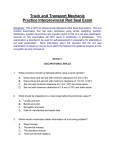
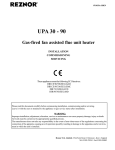
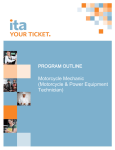
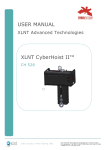
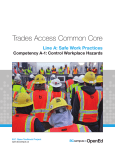
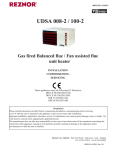
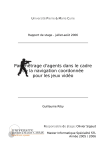

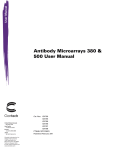
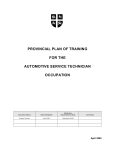



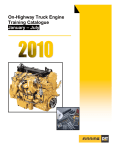

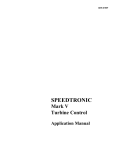
![reply_card [Converted] - TheMysticHelming.mono.net](http://vs1.manualzilla.com/store/data/005649301_1-3a046a309a634867449ff92cdd957a65-150x150.png)
